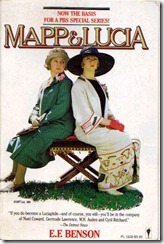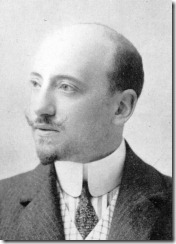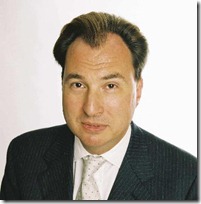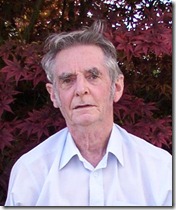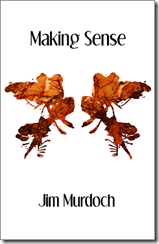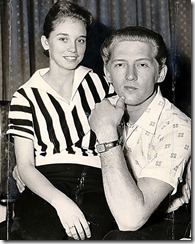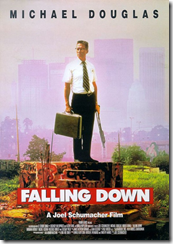[I]t’s not as simple as “It’s shite being Scottish.” The truth is, it’s both shite and great being Scottish, often simultaneously. – Doug Johnstone, The Ossians
If you’re thinking of taking a tour of Scotland you can either flick through a travel brochure and gawp at all the picturesque places there are (and there are) or you could treat yourself to a copy of Doug Johnstone’s The Ossians. The difference? The travel brochure will present you with the skin of Scotland (photoshopped to within an inch of its life) but beauty, as the old adage goes, is only skin deep. If you want to get to the heart of Scotland read The Ossians. There you'll also find the kidneys, its sickly liver, the spleen, the intestines and the arsehole. Several arseholes in fact. One of the arseholes is the book's antihero, Connor Alexander, “an egocentric, introspective, self-absorbed, narrow-minded bigot” (his words), the founder and lead singer of The Ossians, “a shit, narrow-minded indie band, with pretentions of intelligence”—again Connor’s words, not mine, but you’ll get no argument from me on either count.
When I first heard that Doug was looking for reviewers for this book I hesitated thinking it might be a Tartan Noir crime novel or a thriller, which is how his other books have been described, but while there are numerous criminals within its pages (mostly petty) that's not what the book is really about. I personally hoped it was going to be a cross between two films that I’d enjoyed immensely in the late nineties: Trainspotting and Still Crazy. The former I would imagine needs no introduction but it was the film that reminded the world that snooty, culturally rich Edinburgh was also the crack capital of Europe. Rather than focusing on the official face of the city—on Princes Street, the castle and the Royal Mile—the story revolves around a group of heroin addicts in an economically depressed area of the city (portrayed, in the film, by economically depressed areas of Glasgow actually). Still Crazy is a film about a fictional 1970s rock band named Strange Fruit who are persuaded to get back together to perform at a reunion of the same concert venue where they played their last gig; comedy and pathos ensue. Now I’ve finished the book I have to say it lived up to my expectations—The Ossians: Trainspotting meets Still Crazy.
Trainspotting is definitely a touchstone for Doug. It’s referenced a number of times in the book, for example:
Here’s your Scotland, delivered just the way you like it, straight off a fucking shortbread tin or postcard, with snow-peaked turrets, a bridge and the lapping waters of the loch, and only eighty years old. In Scotland, you either had this piece of twee tourist bollocks, or you had Kyle of Lochalsh up the road – nasty, ugly and depressing. You either had Edinburgh Castle and Brigadoon or you had Trainspotting. But then Trainspotting had become another version of the same thing, hadn’t it? They ran Trainspotting tours of Leith, for Christ’s sake. Didn’t that just misrepresent the country as much as Highlander?
Trainspotting, if you’ve ever tried to read it, is hard work even if you’re a Scot. Irvine Welsh takes no prisoners. It was long listed for the 1993 Booker Prize and was apparently rejected for the shortlist after, so says Welsh in his autobiography, “offending the sensibilities of two judges”.
Welsh explores in depth the absence of a true Scottish national identity. Renton displays a great self-loathing of his country, which he views as a nation "colonised by wankers". Welsh suggests that the idealised image of "Scotland the Brave" is a false heritage, a sentimentalised vision of Scotland perpetuated by events such as the Edinburgh Festival. Welsh also attacks Unionism through Renton's description of his father's Protestant loyalist family. (this is portrayed in the movie after Renton tells Sick Boy "It's shite being Scottish!" and proceeds with his diatribe). – Wikipedia
Just comparing the quote from Wikipedia and the quote from The Ossians it’s easy to see the similarity between the two books. Doug’s book is nowhere near as graphic or violent as Trainspotting. It also pretty much sticks to standard English which, if you’ve ever tried to read Trainspotting, you’ll thank him for.
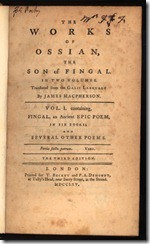 The Ossians (named after the narrator and purported author of a cycle of epic poems which the Scottish poet James Macpherson published beginning around 1760) are a fictitious Edinburgh-based band comprising Connor (vocals), Kate Alexander (bass and backing vocals), Danny McIntyre (drums) and Hannah Reid (guitar and keyboards); the latter three's relationship to Connor being twin sister, best friend and girlfriend in that order. They have been together as a band for five years but have yet to hit the big time. They’ve released three EPs, have a small, loyal fan base and, at the end of the tour that comprises the bulk of the book, are headed for a gig in Glasgow where there will be people from some London labels waiting to (hopefully) sign them. All they have to do is get through all the other gigs first. Simples, yes? So it’s a fairly common trope—think of both Bill and Ted films—they have to survive a series of challenges and get to their final trial on time upon which everything hangs.
The Ossians (named after the narrator and purported author of a cycle of epic poems which the Scottish poet James Macpherson published beginning around 1760) are a fictitious Edinburgh-based band comprising Connor (vocals), Kate Alexander (bass and backing vocals), Danny McIntyre (drums) and Hannah Reid (guitar and keyboards); the latter three's relationship to Connor being twin sister, best friend and girlfriend in that order. They have been together as a band for five years but have yet to hit the big time. They’ve released three EPs, have a small, loyal fan base and, at the end of the tour that comprises the bulk of the book, are headed for a gig in Glasgow where there will be people from some London labels waiting to (hopefully) sign them. All they have to do is get through all the other gigs first. Simples, yes? So it’s a fairly common trope—think of both Bill and Ted films—they have to survive a series of challenges and get to their final trial on time upon which everything hangs.
The self-destructive tortured artist is a cliché: Pete Doherty, Courtney Love, Iggy Pop and Ozzy Osbourne still hanging in there; Joplin, Cobain, Morrison, Vicious and Hendrix among the not so lucky.
Artistically, it's best approached the way David Bowie did it in the mid-1970s. His cocaine addiction turned him into a withered stick-insect figure of a man but also inspired the best music of his entire career. Then he sorted himself out and became the golden-haired survivor we know and love today. That's the trick of course: to "destroy" yourself but somehow "redeem" yourself artistically in the process and become stronger as a result. – Nick Kent, ‘Stairway to Hell’, The Guardian, 19 April 2001
It’s hard to say where Connor sits. The keyboard player in Spın̈al Tap had a simple philosophy of life: "Have a good time all the time […] Pain—who needs it?" Connor could never say that. He’s in constant pain, mental and physical:
He felt the joint top up his level of stonedness, which was combining with the smacky aftermath of what had turned out to be a pretty dodgy E. In turn, the alcohol was taking the edge off the stoned feeling, and the speed was sharpening up the boozy fuzz. On top of it all he’d snicked a couple of Feminax off Kate for the pain in his mouth and this bloody headache, and they were starting to ooze through him. Just another night in the drug cocktail cabinet of his body.
The hope is, of course, that this will be one giant learning curve for Connor. It’s him who made the decision to tour up north “looking for the real Scotland, a tangible nation, something he could call home at least.” So, on top of being egocentric, introspective, self-absorbed, narrow-minded and bigoted, he’s also a bit naïve. But then he is only twenty-four.
We don’t get much back story here. Did Connor become wrapped up in the rock and roll dream or was he simply ill-prepared for it and has turned to drink and drugs to help him cope? I suspect the latter.
In an interview Connor talks about his drug of choice:
Drugs are supposed to get you fucked up, right? And what gets you more fucked up than booze? Nothing. And it’s fucking legal, which is genius. It’s amazing what the human body and mind can achieve fuelled by booze. Great works of art can be created and great pains can be numbed, and all you get is a wee hangover, and probably some chilli sauce stains on your trousers from a kebab on the way home. I’m not advocating that anyone dabble in kebabs, you understand. Evil, nasty things, kebabs. Never touch them.
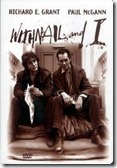 Everyone drinks too much in the band but no one drinks more than Connor who’s perpetually wandering around with a large lemonade bottle filled with gin and tonic. If this is ever filmed—and I do think it’s eminently filmable—I can see it becoming a cult with its own drinking game like the one associated with Withnail and I. Seriously Connor puts a lot away during this book. As he says to his girlfriend after she expresses concern for his health (in particular his headaches and his insomnia):
Everyone drinks too much in the band but no one drinks more than Connor who’s perpetually wandering around with a large lemonade bottle filled with gin and tonic. If this is ever filmed—and I do think it’s eminently filmable—I can see it becoming a cult with its own drinking game like the one associated with Withnail and I. Seriously Connor puts a lot away during this book. As he says to his girlfriend after she expresses concern for his health (in particular his headaches and his insomnia):
‘Fucking hell, love, give it a rest. Everyone drinks.’
‘Not like you.’
‘I’m the troubled artist, amn’t I?’ said Connor, wagging a finger. ‘The old Cobain syndrome, nobody understands my torment and all that pish.’
[…]
They all drank a lot, a shitload in fact, but he drank differently. They all relaxed when they got pissed, but Connor only became tighter and tighter with every gin.
Now as if watching the train-wreck-in-progress that is Connor isn’t entertaining enough there is an actual story here. In Trainspotting the nasty piece of work is Begbie; in The Ossians its Nick Simpson to whom Connor is in debt and Nick is not the most patient of men:
As he came out the cubicle he was grabbed by a massive pair of bear mitts and thrown hard against the far wall, banging his head against the cold tiles.
‘What the fuck?’ he said, shaking his head. In front of him was a tiny man, not much more than five feet, with a bald head and heavily creased face. Behind him loomed a big bastard mountain of a guy, rubbing his hands together like a kid eagerly awaiting his dinner.
‘Nick, I was going to come see you tomorrow,’ said Connor to the smaller guy. ‘Honestly, I just had to get this gig out the way then . . .’
The short man held up a hand gently as if trying to flag a bus.
‘Save it, Con,’ he said in a high-pitched Highland accent. ‘You’re just embarrassing us all with that bullshit. We both know you’ve been avoiding me, and we both know why. The little matter of thirteen hundred quid for drugs which, I assume, you either gave away when you were cunted, or just took yourself, with no intention of ever paying me back. It’s my own fault, of course. I should never have let you run up a fucking tab. Stupid really.’
‘I’ve got the money, Nick, I just need to get it . . .’
Nick held up his hand again, this time gesturing slightly to the big lump of meat behind him, who strode forwards.
‘Shug, wait . . .’ said Connor as the big guy punched him square in the face, making his head crack off the tiled wall again.
‘Jesus fucking Christ,’ said Connor, holding his nose. Blood seeped through his fingers.
‘Hold your head back,’ said the big guy in a friendly voice, handing Connor a tissue. ‘And pinch the bridge of the nose, that helps stop the bleeding.’
‘Listen to Shug, he knows what he’s talking about.’
‘Fucking cheers,’ said Connor through his hands, but tilting his head back nevertheless.
‘Now,’ said Nick. ‘What are we going to do about this debt?’
Connor kept quiet. Pain throbbed back and forth across his face and his forehead as he dabbed at his nose and lip with the tissue.
Nick’s solution is simple. He knows about the band’s tour and insists Connor take four packages with him that he is instructed to exchange for four other packages: drugs for money and money for drugs Connor assumes. Failure to comply is not an option nor is failure to execute the drops as planned (and we all know right from the off that’s not going to go as planned). As the tour gets under way Connor becomes increasingly paranoid. He’s convinced he’s being watched from the shadows. The thing is, he is. Is it the cops or perhaps a guardian angel? Or something else entirely?
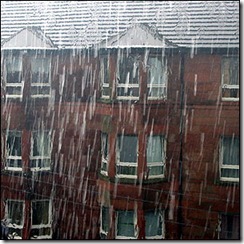 The tour takes them from Edinburgh through South Queensferry, St Andrews, Dundee, Arbroath, Aberdeen, Inverness, Thurso, Durness, Ullapool, Kyle of Lochalsh, Fort William, Corrour (not actually part of the tour but another nod to Trainspotting) and culminates in Glasgow:
The tour takes them from Edinburgh through South Queensferry, St Andrews, Dundee, Arbroath, Aberdeen, Inverness, Thurso, Durness, Ullapool, Kyle of Lochalsh, Fort William, Corrour (not actually part of the tour but another nod to Trainspotting) and culminates in Glasgow:
Of course, it would be raining by the time they got to Glasgow. It always rained in Glasgow, as if that blighted city had invented the stuff.
The adjectives used to describe any one of these stops are pretty much interchangeable: “grey”, “dingy”, “miserable”, “ugly”, “crumbling”… Here, for example, is how he describes Thurso:
Within two minutes they’d driven round the centre, a small grid of houses in mushy brown and splashy grey with shop fronts poking out on the ground floor, and a tiny pedestrian precinct that looked straight out of an Edinburgh housing scheme.
The band are well and truly out of their comfort zone but they soldier on. Few of the gigs could be described as successes. A number end in punch-ups.
The book when it first came out in 2008 (it’s just been rereleased as an ebook) was well received. Ian Rankin called it, “A powerful and moving commentary on the country and its defining myths,” although I’m not sure that I’d call Connor a “visionary” as did Niall Griffiths. I tend to agree more with the Amazon reviewer who said:
My main gripe though is with the main character who I've heard described in other reviews as [e]nigmatic, talented, out-spoken, a visionary. Well, I don't know about that but he came across to me as just a bit of a git who in the main and on most occasions just had me thinking `what are you doing that for?' So hat's off to the author for moving me to feel so strongly about the guy. All I can say is – He gets punched a lot and I can see why.
I do think his star rating—he awards the book a measly two stars—is harsh although he’s not the only one to criticise the editing and the slow start. The real question for me was: How was Doug going to handle the climax? Was Connor going to “redeem” himself in the fashion of David Bowie, was he going to hurtle off the stage at the end and go out in a blaze of glory or was he going to fade into obscurity choking on his own vomit? I’m not going to say.
“I’m the biggest fuck-up you’re ever likely to meet. I’m a complete arsehole, a selfish wanker, a pretentious dickhead. Just ask the rest of the band if you don’t believe me.” Connor is not far wrong there and yet there is a decent guy at the heart of this pain in the arse. I found him hard to relate to but not hard to root for.
This is a far more talky book than one might have expected. It’s not without action but it really is more of a meditation—albeit something of a foulmouthed one. In a comment to the review on Vulpes Libres Doug writes:
Safe to say, reaction to Connor has been mixed, but I was trying to prove you could spend 300 pages with someone who you wouldn’t necessarily want to share a pint with. Whether I succeeded or not is down to the reader I guess.
The national identity wasn’t a “red herring” … it was the main theme of the book, kind of. I wanted to try and tie in Connor’s search for meaning in his own pampered life with his and his country’s search for a meaningful identity. The juxtaposition of rural Scotland and rock ‘n’ roll was another thing I wanted to explore … I was trying to tie in the myth of national identity with the myth of rock ‘n’ roll, both empty promises. Ultimately, of course, Connor doesn’t find a home, or meaning, or anything, really, which was kind of the point.
I, for my part, liked the book a lot. It was literary, intelligent and appealed to my sense of humour. It may not be his best novel—“the recently published Smokeheads is a real step forward in terms of style and voice” according to Dear Scotland—but just as its flawed protagonist is hard to dislike I also found myself willing to be more forgiving of his creator than maybe he deserved. The only way you’ll know is to find yourself a copy and make your own mind up.
You can read the first chapter here.
***
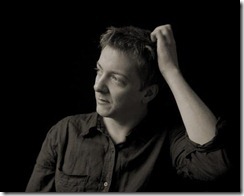 Here’s the bio from his website:
Here’s the bio from his website:
Doug Johnstone is a writer, musician and journalist based in Edinburgh. His fourth novel, Hit & Run, was published by Faber and Faber on March 15th 2012 and was recently an Amazon #1 Bestseller. His previous novel, Smokeheads, was published in March 2011, also by Faber, and has been nominated for the Crimefest Last Laugh Award. Before that he published two novels with Penguin, Tombstoning (2006) and The Ossians (2008), which received praise from the likes of Irvine Welsh, Ian Rankin and Christopher Brookmyre.
Doug was writer in residence at the University of Strathclyde 2010-2012 and before that worked as a lecturer in creative writing there. He’s had short stories appear in various publications, and since 1999 he has worked as a freelance arts journalist, primarily covering music and literature.
He is a singer, musician and songwriter in several bands, including Northern Alliance, part of the Fence Collective. Northern Alliance have released four albums to critical acclaim, as well as recording an album as a fictional band called The Ossians. Doug also plays drums in Achilles and released his debut solo EP, Keep It Afloat, in 2011.
Doug has a degree in physics, a PhD in nuclear physics and a diploma in journalism, and worked for four years designing airborne radars and missile guidance systems.
He grew up in Arbroath and lives in Portobello, Edinburgh with his wife and two children. He loves drinking malt whisky and playing football, not necessarily at the same time.
You can hear some of the songs referenced in the book here.



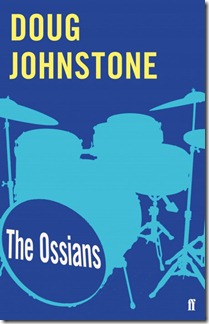
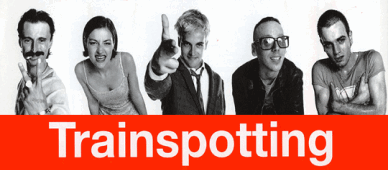
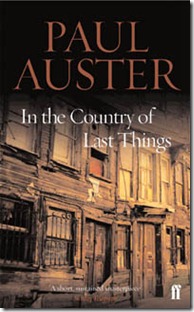

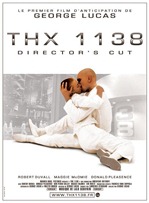
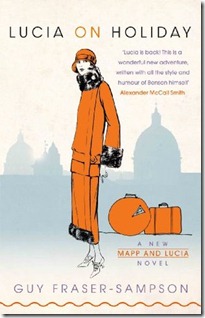
 Bottom line, would I recommend this book? Absolutely. As long as you know what you're getting into. The simple fact is I was smiling by the end of the first page and I continued to smile throughout the book. Is it an easy read? Yes and no. You could rush through this book and get the gist but the whole point of a book like this is to stroll through it like any of the residents wandering up Tilling High Street on the lookout for some juicy gossip. If you tread carefully you will be rewarded.
Bottom line, would I recommend this book? Absolutely. As long as you know what you're getting into. The simple fact is I was smiling by the end of the first page and I continued to smile throughout the book. Is it an easy read? Yes and no. You could rush through this book and get the gist but the whole point of a book like this is to stroll through it like any of the residents wandering up Tilling High Street on the lookout for some juicy gossip. If you tread carefully you will be rewarded.